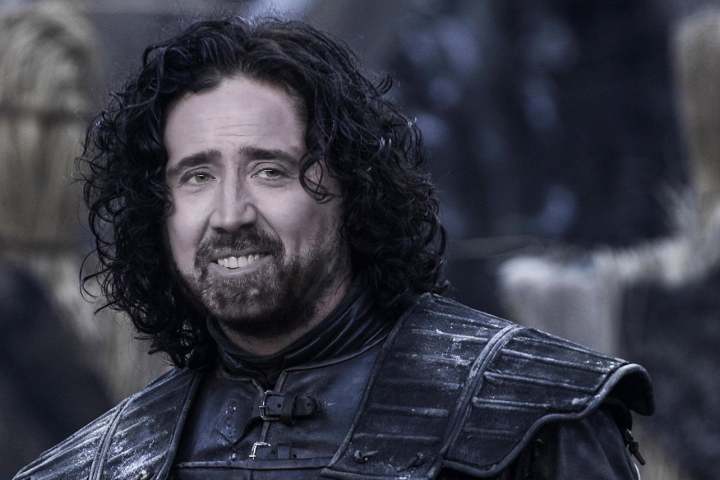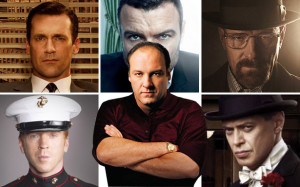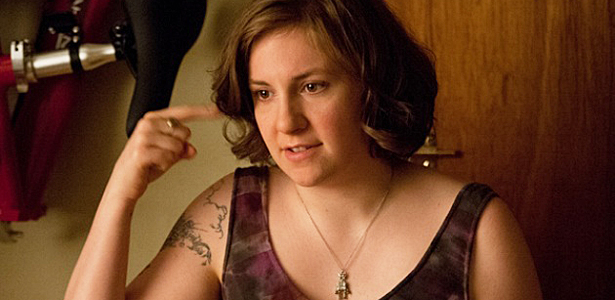
oh my…
Who is your favorite Game of Thrones’ character? Actually, hold up, let me guess. I bet it’s Tyrion. Wait, no Arya? Actually, on second thought, it doesn’t matter ‘cause Screencrush did a complete ranking for you. Here’s your top five:
- Arya Stark
- Jaime Lannister
- Sandor “The Hound” Clegane
- Tyrion Lannister
- Brienne of Tarth
Now, put on your most socially-progressive thinking cap (Gloria Steinham’s slouchie, if you have it), What do you notice? There are 2 full-sized men on the list above, one dwarf (in Westoros, little people are still denigrated through the dominant lexicon), and two women. The women are heralded for their ability to survive in a world that makes their survival unlikely. They do so by pursuing violent revenge, which is a reflex to the brutality that has been thrust upon them by the creators of the dominant masculine culture. Put simply, they’re given credit for adopting the actions of the violent men that have wronged them, while maintaining (mostly) moral intentions. Like Arya and Brienne, Tyrion is forced to participate in a world that isn’t meant for him. Despite a voracious sexual appetite and a robust surname, Tyrion isn’t given the same deference as the other powerful men in Westeros. His tininess has effectively neutered him. In fact, the only one who seems to appreciate Tyrion’s gift for logic and diplomacy, is an actual eunuch.
So that leaves The Hound and Jaime Lannister. In [ned] stark contrast to the reasons we root for Brienne, Tyrion, and Arya, we applaud these men for the brief glimpses of decency they exhibit. Like a silly woman, the more time we spend with these men, the more we think they’ll change their ways, despite plenty of evidence that their humanity comes and goes. I know Jaime Lannister is a real knee-weakener so maybe you’ve forgotten this, but in the very first episode, he pushed a curious little boy out of a castle window while trading orgasms with his sister (a Lannister always pays his debts). Is it your fault that your second favorite Game of Thrones character is a murderous incestor? Not at all, friend! We’ve been conditioned to root for awful awful characters, you know, as long as that character isn’t a woman.
A lot has been made recently of television’s emergence as the new venue for auteurs. With The Sopranos, David Chase laid the tracks down for showrunners and writers to create fully-formed worlds with nuanced, complicated characters that are given the time and space to exhibit believable emotional arcs without shoehorning their story into three-act structures. In this medium, we’ve seen shows about all sorts of things, but they consistently focus on men that do despicable things. With Breaking Bad, Vince Gilligan actually set out to turn his protagonist from someone who elicits sympathy from the viewer into someone who could not possibly deserve that kind of sympathy, but that never totally happened. No matter what Walter White did – and he did some terrible things – viewers still rooted for him. In an interview with the Guardian, Gilligan said “I find it interesting, this sociological phenomenon, that people still root for Walt. Perhaps it says something about the nature of fiction, that viewers have to identify on some level with the protagonist of the show.”
This was a long-winded way of describing something that probably doesn’t need describing. Over the last twenty years, many of TV’s most significant shows focused on antiheroes, but more specifically, male antiheroes. The ever-extending tendrils of modern television have given rise to protagonists that are barely recognizable from the traditional network archetype, but I would suggest these shows have created a brand new archetype, for an antihero, that is potentially as restrictive a set of guidelines as the previous model.
So if the expansion of TV dramas has allowed for non-traditional protagonists, why are there no real female antiheroes? Well shit, before I get into that, I should probably create a fool-proof template to assess what makes a character an antihero, and apply it to make sure my assertion that no leading woman qualify is correct (spoiler alarm: it was!).
____________________________________________________________________________________________
Okay, so there are three obvious example of TV antiheroes: Tony Soprano (The Sopranos), Walter White (Breaking Bad), and Don Draper (Mad Men). These three shows are also widely considered three of the top four TV dramas of all time (The Wire, being the fourth, features two fringier antiheroes in McNulty and Omar). There are also countless examples of lesser shows attempting to mimic this trend: Frank Underwood (House of Cards), Vic Mackey (The Shield), Rust Cohle (True Detective), and Dexter (…Dexter). So let’s take a look at what these gentlemen have in common.
- They’re Good at what they do. Whether they’re a cop, a gangster, or a stuffed cowboy, they demonstrate an ability to do their job above replacement value. Walter makes the world’s best meth, Draper is New York’s most innovative ad man, Dexter is meticulous and careful in his serial killing, and I’m pretty sure Frank Underwood is the goddamn president now.
- They’re behavior is Selfish, and their primary motivation is self-interest. This is often demonstrated by impatience, and a roaming sense of empathy. Consider the inner monologue of Frank Underwood, and how that drives all his behavior.
- They’re Violent. This is less true for Don Draper than everyone else, even though he’s probably the most physically imposing of the group. The others use violence as means of solving problems, or expressing frustration. Even Walter White, who is the least physically equipped to deploy violence, effectively murdered a teenage girl and poisoned a little boy.
- They’re Liars, and the people who are most affected by their lies are those closest to them. This one covers romantic infidelity, which pops up a lot. Even Rust Cohl, who may possess the fewest antihero qualities, slept with his partner’s wife.
- They are Architects of the dominant culture within the show AND architects of their own destruction. This one is important, because there is a thin line between someone who acts badly when given a reason, and someone who creates their own reasons to act badly. Traditional protagonists are often forced to do things they wouldn’t normally do as a reaction to something that has been done to them. An antihero might initially cross some sort of similar threshold, but ultimately, that motivation fails to explain their behavior. Walter White starts selling meth so that has something to leave behind for his family after he dies, but that justification largely disappears in the first season when his friends offer to pay for his treatment. Before he became Don Draper, Dick Whitman was an abused orphan that possessed none of the swagger he would develop after stealing the identity of his Korean War captain (who blows up), so it makes sense that Dick crafted a whole new identity for himself. It makes less sense that Dick’s meek background justifies his constant infidelity, alcoholism, and penchant for emotionally abusing the women he’s close to. Tony Soprano is humanized because he sees a therapist and loves ducks, but he sure does kill a lot of people. What’s more, an antihero often supplies the action needed for other characters to react with similar depravity. Basically, they construct a world where their behavior makes sense, and others are forced to live in it.
- If the character was a real-life human that you knew intimately, you would think they’re A Bad Person.
By averaging out the scores of the [both] Computer Newspaper’ editors on a 1-10 scale (10 meaning they fully embody the trait), I’ve graded the following five antiheroes: Tony Soprano (The Sopranos), Don Draper (Mad Men), Walter White (Breaking Bad), Dexter (Dexter), McNulty (The Wire). I included McNulty, ‘cause The Wire is the shit, and I wanted someone to push the threshold between hero and antihero. Also, it’s important to remember that this range is intended to be applied to any protagonist — not just antiheroes.
****note: I’ve been told that Vic Mackey, from The Shield, is perhaps television’s greatest antihero, but I’ve never seen an episode, so it will be omitted.
Tony Soprano:
- Good At What They Do: 8
- Selfish: 8
- Violent: 10
- Liar: 9.5
- Architect: 8.5 (Tony was born into a family of gangsters, so his presumably there was never much of a threshold he had to cross in order to enter that world)
- A Bad Person: 8
total: 52.5
Don Draper:
- Good At What They Do: 10
- Selfish: 9
- Violent: 4 (sexually and emotionally abusive)
- Liar: 10
- Architect: 7.5
- A Bad Person: 7
total: 47.5
Walter White:
- Good At What They Do: 10
- Selfish: 9.5
- Violent: 9
- Liar: 10
- Architect: 8
- A Bad person: 9
total: 55.5
Dexter:
- Good At What They Do: 9]
- Selfish: 7
- Violent: 10
- Liar: 8
- Architect: 6
- A Bad Person: 6
total: 46
McNulty
- Good At What They Do: 8.5
- Selfish: 7.5
- Violent: 8
- Liar: 6.5 (In Season 5, McNulty creates a fictional serial killer)
- Architect: 7 (See above. The ends justify the means baybay)
- A Bad Person: 3.5
total: 41
All five characters scored over 40 points, so conservatively, we’ll set the mark for a character to be considered an antihero at 35.
____________________________________________________________________________________________
The Ladies
When considering which female protagonists from television might be considered antiheroes, it’s immediately clear the pool of potential candidates is much smaller. While doing research for this article, I found the following characters described as antiheroes: Nancy Botwin (Weeds), Carrie Mathison (Homeland), Elizabeth Jennings (The Americans), Piper Chapman (Orange is the New Black), and Hannah Horvath (Girls).
Nancy Botwin
To be completely transparent, I didn’t make it through Weeds (because, you know, it’s not very good), so perhaps I’m not equipped to make a full assessment, but The Computer Newspaper is in the business of selling computer newspapers, not researched hypotheses. On the surface, Nancy has a lot in common with Walter White. She sells drugs to support her family, but that’s pretty much where the similarities end. She’s a single mother who begins selling weed after her husband’s death leaves her in overwhelming debt. I mention this because this remains her motivation throughout the run of the show. Unlike Walter White, Nancy’s incentive to operate in an illegal industry is fueled by her desire to provide for her children. This is an inherently unselfish motivation. She is not violent, and is never portrayed as a bad person. Most importantly, she is not the architect of the depraved world she’s operating within.
- Good At What They Do: 8
- Selfish: 3
- Violent: 3
- Liar: 5
- Architect: 5
- A Bad person: 3
total: 27
Carrie Mathison
Another flawed show, Homeland’s protagonist is an agent for the CIA who is irrational, impulsive, and destructive. She’s also bipolar and is singularly motivated by the desire to protect her country from harm. Really, she’s more Jack Bauer than Tony Soprano.
- Good At What They Do: 6
- Selfish: 6
- Violent: 6
- Liar: 5
- Architect: 1
- A Bad person: 5
total: 29
Elizabeth Jennings
The only way Elizabeth would be considered an antihero, is when compared to her husband. She’s good at her job, which means she’s effectively violent, and she lies to pretty much everyone, but that’s where it ends. She’s motivated to protect her country (and her kids), and is constantly compelled to follow order — something an antihero would never do.
- Good At What They Do: 8
- Selfish: 2
- Violent: 8
- Liar: 5
- Architect: 2
- A Bad person: 4
total: 29
Piper Chapman
What a fish out of water!
- Good At What They Do: 5
- Selfish: 2
- Violent: 2
- Liar: 2
- Architect: 1
- A Bad person: 2
total: 14
Hannah Horvath
I found the inclusion of Hannah on these lists to be puzzling, and frankly pretty sexist. The resounding criticism of Girls is that none of the characters are likeable. I would argue against that, but either way, Lena Dunham seems uninterested in creating characters that the viewer is compelled to root for or against. Hannah is selfish, but not in a way that hurts others. She’s a good writer, but is constantly humbled by her peers. She lies, but mostly to herself. To call Hannah an antihero because she’s a 23 year old girl that reminds us of somebody we know and dislike, is reductive to what Dunham is attempting. Hannah is a contradiction – a selfish millennial who tries to do good, but only when people are watching. She’s as funny as she is exhausting, because that’s what people are like. If Hannah is an antihero, so is Larry David.
- Good At What They Do: 6
- Selfish: 9
- Violent: 1
- Liar: 4
- Architect: 6
- A Bad person: 4
total: 30
____________________________________________________________________________________________
So in this fool-proof system, none of the women mentioned come close to qualifying as legitimate antiheroes. That may be further proof there aren’t enough quality roles for women in Hollywood, or more troublingly, it may reflect a discomfort our culture maintains for seeing women behave in a way we’re unaccustomed to. Most of the women listed above act out of a maternal need to protect something bigger than themselves (country or family). When others are hurt by their actions, they often show remorse. The men described in this article are motivated by self interest. When others are hurt by their actions, they dismiss it as collateral damage. What’s interesting about this exercise is not just how few women qualify, but how audiences reacted to the women close to the male antiheroes. People hated Carmella Soprano, Betty Draper, and Skyler White for being affected by the behavior of their terrible husbands. If the roles were reversed, I doubt we’d vilify the husband of a cheating, murderous, female lead. TV’s first actual female antihero will act deplorably – not as a response to an evil thrust upon them (Jessica Jones), nor as the driving source of evil on the show (Cersei Lannister), but as a response to her own demons. The way television has evolved recently, I don’t doubt we’ll see this type of character soon. After all, it’s always darkest before the dawn…draper.
- Posted by Travis Lindner
- Computer Newspaper
- 0 Comment








